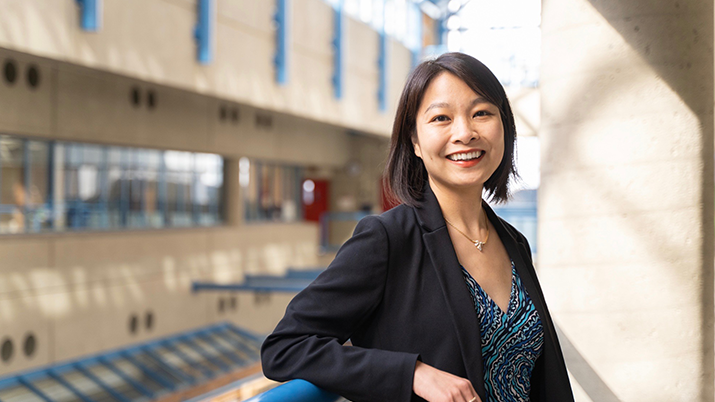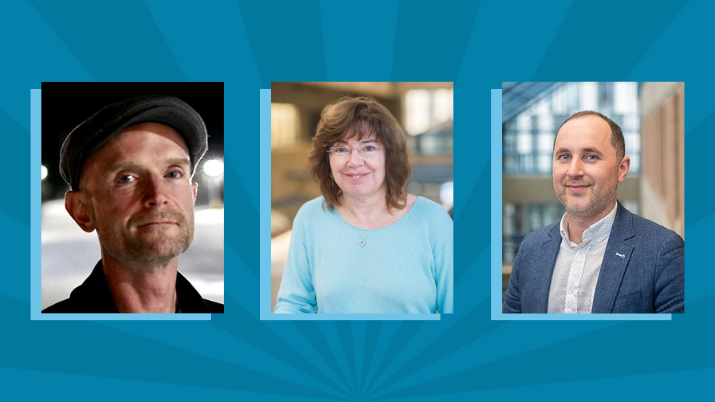

Dr. Nancy Sin. Photo credit: Paul Joseph, UBC
Our Diversity Mentorship Program offers students a personalized journey for graduate school and research.
Dr. Nancy Sin (she/her) and UBC Psychology’s Mentorship Working Group are leading the effort to provide students from diverse, under-resourced, and under-represented backgrounds with mentorship. The Diversity Mentorship Program, now in its second year, aims to help students navigate the graduate school application process and research careers in psychology.
Applications to be a mentor or to be mentored are open until September 7, 2022.
Dr. Sin, an associate professor in UBC’s department of psychology and co-creator of the program, shares her motivation behind the program and the new enhancements to this year’s cycle.
What is your motivation for creating this mentorship program?
It’s well-documented that mentorship is a major driver of academic and professional success, and that good mentors are among the strongest predictors of academic outcomes and satisfaction when students transition into graduate school and beyond. This is especially important for students who come from under-represented and historically excluded backgrounds because mentors can offer support, professional guidance, advocacy, and important networking opportunities.
My motivation for launching this program was to bring these key success factors for students who might not otherwise have these sources of support or insider access to information about academia and psychology careers.
Who are the people involved in this program?
This program reflects immense contributions and hard work from a number of people. I worked closely with other members of the UBC Psychology Equity Committee since early 2021 to launch the program. In our first year alone, we had 34 mentors who were graduate students and postdoctoral fellows, as well as 101 mentees who were undergraduate students or recent graduates interested in pursuing graduate studies in psychology.
Looking forward to this upcoming year, I want to acknowledge the invaluable contributions of the Mentorship Working Group, namely Benjamin Cheung, Connor Kerns, Todd Handy, and Ellen Jopling. We don’t know how many mentors and mentees we will have this year, but we’re hoping for a really wonderful and vibrant group!
What are some of the lessons learned from last year’s program and what changes were made this year?
We’ve received extensive and valuable feedback from last year’s mentors and mentees. And on the whole, I’m happy to share that we heard very positive things. The mentors said that they enjoyed meeting students from different background and from around the world, and that it was rewarding for them to support the field’s next generation of scholars. On the mentee side, many expressed that they felt supported and valued, and that they benefited from the feedback they had received for graduate school applications.
The mentees also shared that they would want to attend more workshops and to have more opportunities to connect with other people in the program. Moving forward, we plan to hold virtual workshops throughout the year on professional development topics. We will be inviting speakers to talk about different subfields within psychology, career options, their experience as scholars from underrepresented or marginalized backgrounds, etc. Also, instead of the program organizers matching mentors with mentees at the beginning of the year, we decided that it could be fun and lower-pressure for the mentors and mentees to meet in small groups on Zoom. For those mentees who want to further meet with a mentor one-on-one, they can request to be matched with specific mentors.
Considering the virtual nature of the program, what plans do you have in mind to keep mentors and mentees well connected throughout the program?
Mentoring in small group meetings will be great for keeping the mentors and the mentees in the program engaged and involved throughout the year. They would be placed in a new mentoring group for each meeting, so this allows program participants to meet new people every time. And, because we’ll be hosting virtual talks throughout the year, this also provides opportunities for the mentees to see some familiar faces and to hopefully form some friendships.
We’ll also have an online community connected through a Discord channel, where the mentors and mentees can continue to engage, share resources, ask questions, and to give and receive support throughout the year.
What are your main objectives and hopes for the upcoming mentorship cycle?
I hope that the mentors and mentees will feel like they’re gaining something valuable from the experience, and that they’ll form meaningful relationships and learn from one another. I want this program to give them a sense of community and a sense of belonging in the academic space. I also hope the program can provide mentees with access to valuable knowledge, support, and resources so that they have the confidence to move forward in whatever path they choose.
We’ve also put a lot of thought into how this program can be beneficial for the mentors. For example, we are designing the mentorship training that it will address mentors’ needs and questions. We’ll be assigning faculty members from our committee to serve as a resource for each graduate and postdoc mentor, in addition to holding check-ins to address their mentorship-related questions and issues. I believe that this “mentored mentorship” experience will help the graduate students and postdoctoral fellows build important skills that will serve them well in their future careers.
-Othmane Khaled
“I felt really inspired by the speakers at the event and I reflect on their wisdom when I face adversity.”
“The benefit of the program is that I received a mentor that I can relate to. She listens and gives me resources and helps me when I am stuck. I am thrilled to have been a part of this program.”
“I spent all of my undergrad wondering if people who looked like me can really make it into a good graduate school and have a great academic careers, and this program opened my eyes to that possibility. It’s tremendously changed my mental health and confidence in my abilities for the future.”
“It was nice to know that through the whole process I had someone to talk to, someone who had been in my situation. Having a mentor made me realize that there are different outcomes and different times for everyone's goals. It made me reflect about what I wanted to pursue in my life, My mentor serve as a compass that guided me during a time I did not know what I 'truly' wanted.”
“It was inspiring and hopeful to talk to my mentor, and it provided me with clarity and a sense of not being alone in the very confusing landscape of grad school applications. I also did not have to worry about whether my identify as a member of the LGBTQ+ community would get in the way of my mentorship. That helped ease my mind and allowed me to focus on how to get into grad school!”
“My experience in this program was invaluable. I really appreciated the opportunity to have conversations with a fellow LGBTQIA-identifying scholar about the experience of being a part of the margins of the academic community. My mentor helped me bolster my CV and statement of purpose for my Ph.D. applications, prepare for interviews, and was incredibly supportive of my admission to my program.”
“My mentor was extremely helpful! I initially felt a lot of uncertainty on pursuing higher education, and my mentor shared with me his personal experiences in his journey. In applying for the programs, he helped me with my personal statements. During the interview process, he provided tips and questions I should ask. Despite not getting accepted into any programs this cycle, he still helped me after the cycle had ended.”
“As a first-gen student, having someone to turn to when navigating various systems was super beneficial. Also having a reference point when formulating my applications (something I would otherwise have no guidance on) was very helpful.”
“Creating connections with prospective graduate students is wonderful. Rarely do I feel like I have an opportunity to connect with people who share similar identities to me, and doing so in a way where I can support them feels meaningful.”
“It's been really nice for me to provide someone with some of the knowledge and advice I wish I had when applying to grad school”.
“I think the most rewarding part for me is being able to help people who share similar (or different) backgrounds with me, and help them achieve what they want to achieve. I wish I had a mentor when I was applying to grad schools.”
“I liked being able to help students that weren't necessarily from UBC. I worked with students with very different paths to grad school than I took, some had degrees in different fields or were educated in other countries. Helping them find their strengths and showcase them in their applications was incredibly rewarding.”
“iI was very fulfilling for me to have the opportunity to formally support others from around the world in this structured program.”
“I really loved getting to give back to the next generation of psychology grad students.”


